Apr 4, 2025 – Day 47 of 100-Day Dharma Talk, Friday Dharma Q&A
Hello. Today is the 47th day of Venerable Pomnyun Sunim’s 100-Day Dharma Talk. Today features a Friday Dharma Q&A session open to the general public.

After completing his morning practice and meditation, Sunim headed to the Jungto Social and Cultural Center to conduct the Friday Dharma Q&A session. Early in the morning, volunteers were already welcoming citizens who had come to attend the Q&A.
At 10:15 AM, with about 220 people in attendance, the Friday Dharma Q&A session began with the recitation of the Three Refuges and Words for Practice. Approximately 2,300 people were connected to the YouTube livestream.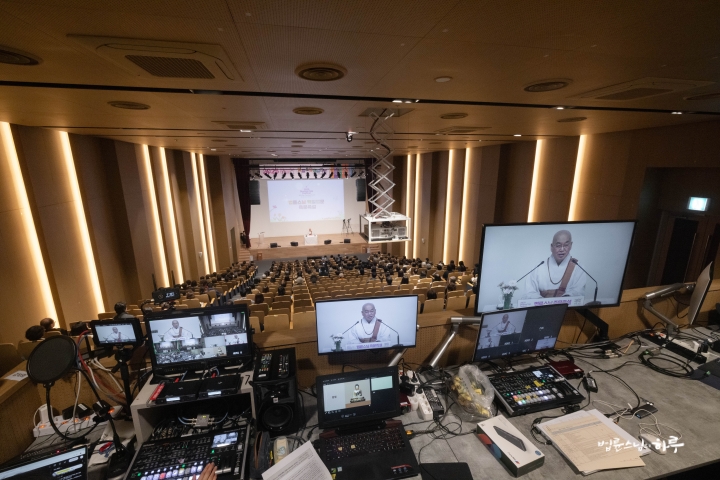
Sunim explained the purpose and format of the Dharma Q&A before promptly beginning the session. During the 90-minute session, five people raised their hands to ask questions. One person sought Sunim’s advice about her husband who wants to quit his job due to stress but continues to overwork himself for the sake of his family.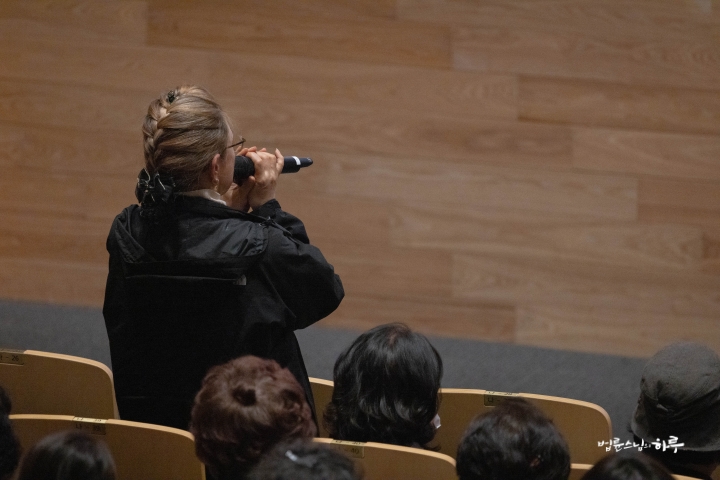
It’s painful to see my husband struggling at work
“Why is your husband’s work causing you suffering?”
“It’s very painful for me to watch him.”
“Why don’t you just leave him be?”
“My husband works from home about ten days a month, so he’s constantly at home.”
“What’s wrong with him being at home? He’s earning money while at home, so just let him be.”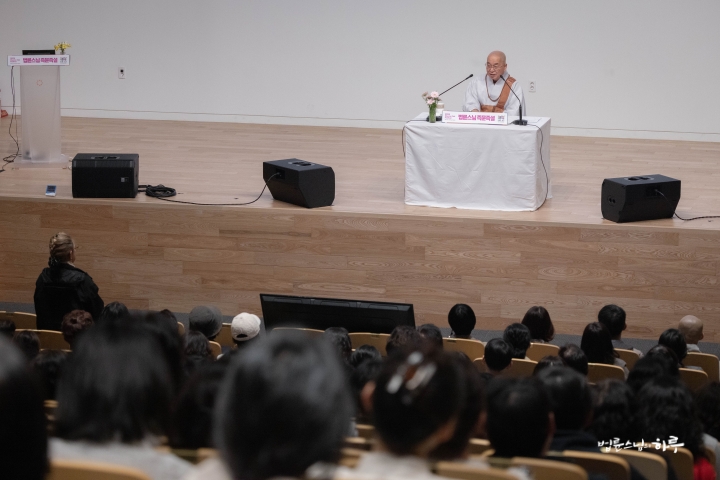
“I think I need to tell him more strongly and sincerely that ‘it’s okay to quit now,’ so that he can make up his mind and prevent his illness from getting worse.”
“Just leave him be. If he really gets so sick that he’s about to die, you can always remarry a healthy man then.” (Laughter)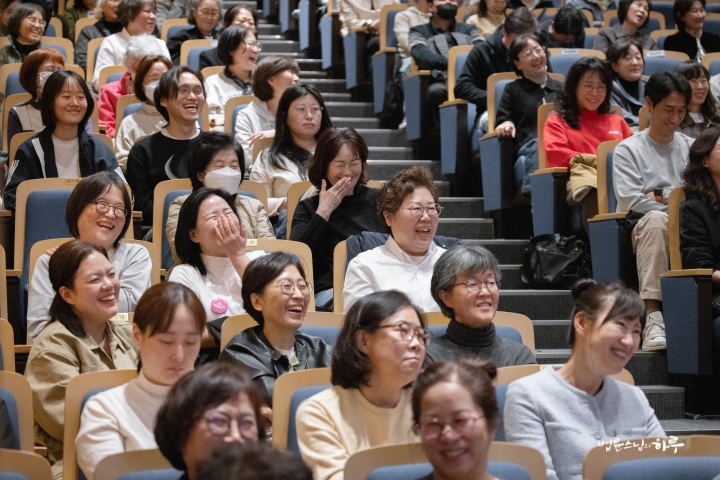
Life and death are ultimately personal matters. What you can do is help by giving him medicine and supporting him. Forcing someone to do something is not within your power. Even between spouses, forcing someone is not a good approach. Instead, you could say something like:
‘Honey, if your health deteriorates like this, what’s the use of earning a lot of money? Why don’t you just quit? If you’re worried about how we’ll make a living, I can get a job. Isn’t it more important to live a long, healthy life even if we eat a little less?’
It’s great if your husband accepts this, but if not, there’s nothing you can do. If he doesn’t accept it, you can change your approach slightly and try again:
‘It’s okay if you continue working at the company. But don’t overdo it, and make sure to take care of your health. What’s the point of earning an extra million won a month if your body breaks down and you die early? It’s much better for our family if you live longer and earn money more slowly. Don’t just think about yourself; think about me and the children too. Let’s work while taking care of your health, for the sake of the family.’
You can certainly try making suggestions like these. However, suffering arises because you think the other person must listen when you say such things. To avoid feeling distressed, try approaching it with a different mindset:’
If you choose to work yourself to death, that’s your choice. Whether you die earning a lot of money or not, I need to live my own life. If I get lonely later, I might meet someone else and start a new life. Either way, I’ll find a way to live.’
If you organize your thoughts this way, you won’t suffer even if your husband doesn’t listen to you. For example, if you tell your husband not to drink and he doesn’t listen, you get angry. But if you change your mind and accept it by saying, ‘Fine, drink as much as you want,’ you won’t get angry when he drinks. In fact, if he comes home without drinking, you might even feel relaxed enough to pour him a drink. When you approach with a relaxed attitude, your husband will also begin to self-regulate. The moment you change your mind, the reason for your suffering disappears. Sometimes, changing your own mind rather than trying to change the situation can be the solution to the problem.
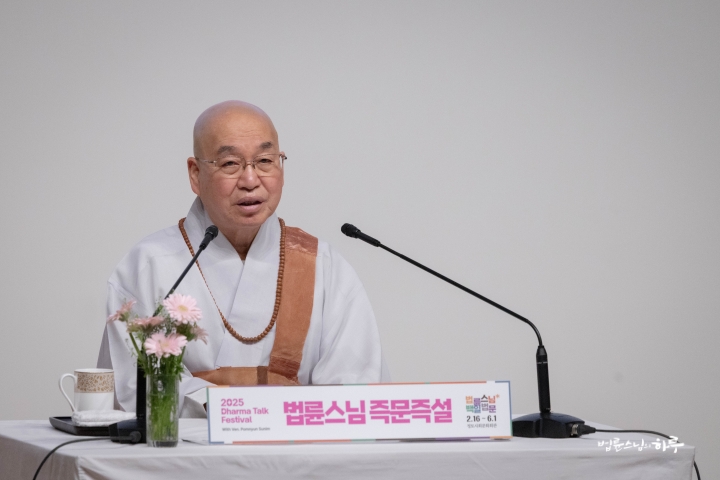
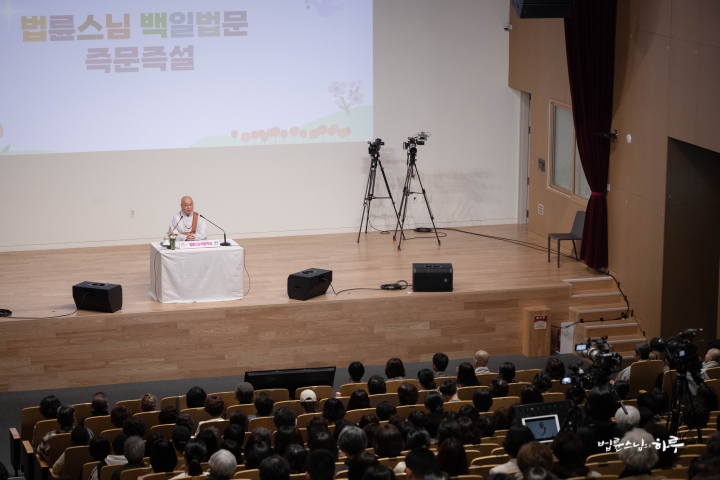
My suffering won’t disappear just because my husband changes. Practice means changing how I view my husband. The key is finding what attitude toward my husband will eliminate my suffering. Your husband won’t necessarily die sooner because he works hard, nor will he live longer just because you tell him not to die. Such words have no real effect, and I cannot intervene in my husband’s life choices. The more I cling to the idea that “my husband must live a long life,” the more anxiety and worry I feel when he doesn’t act according to my wishes.
Think about it objectively. Even if your husband were to die, you would still be able to maintain your life. You can live alone or meet someone else. Life might be a little more difficult than now, but it could also improve. No one knows what the future holds. So don’t become too attached to an uncertain future. It would be morally problematic if I sought divorce for my own benefit, but I cannot make decisions about how my husband lives his life. That’s not my life to live.
So keep an open mind: “If that’s how you want to live, then live that way. I’ll find my own way to live.” I’m not telling you to give up. Since living together is better, try your best. Try better approaches if they exist, but accept that there are alternatives if things don’t work out. Life becomes much less painful when you organize your thoughts this way.
The most important thing isn’t whether your husband changes, but how I can live without worry. Whether your husband drinks or goes to work, that’s not the essence of practice. Practice is about living without suffering. Your husband’s life is his responsibility. How I accept my husband’s life with what mindset—that’s my practice. With this perspective, make suggestions to your husband, but if he doesn’t accept them, find your own complementary solutions. If you keep talking about what isn’t working, the other person will only hear nagging, and ultimately your stress will increase. 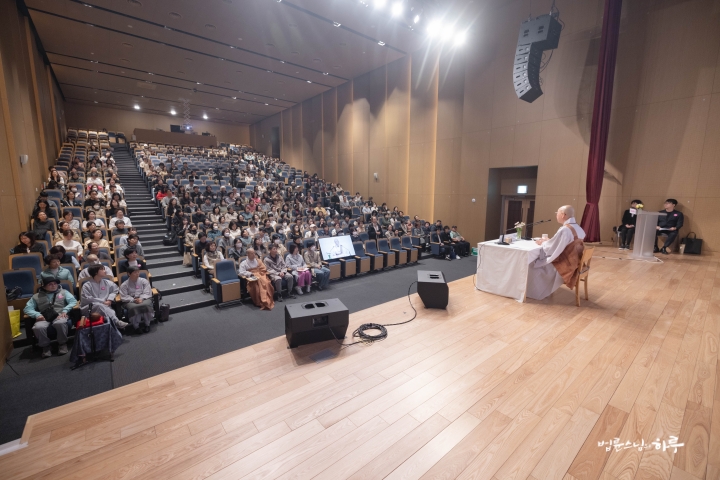
So what can I do? I can prepare food with care for my husband, welcome him warmly when he comes home, and help reduce his stress. I should quietly fulfill the role that I can. Conversely, repeatedly mentioning things that don’t work only creates conflict and increases my worry. Make suggestions, but let go of excessive attachment. Otherwise, both my husband and I will suffer. If I acknowledge and accept that ‘my husband is a hardworking person,’ I’ll feel much more at ease.”
“Thank you. I understand now.”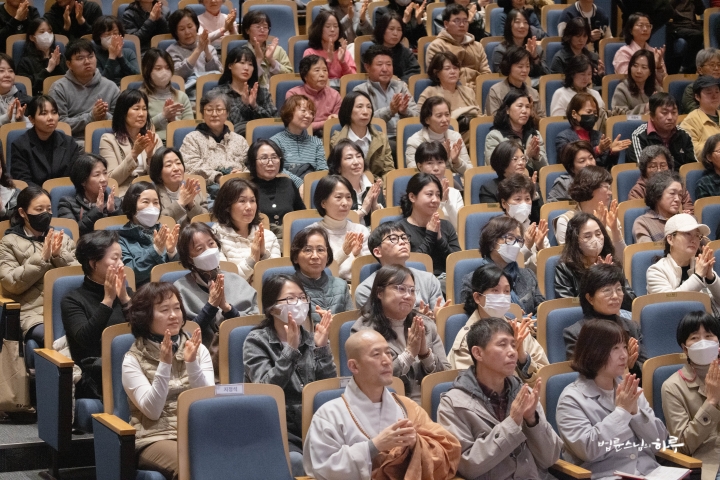
The questions continued.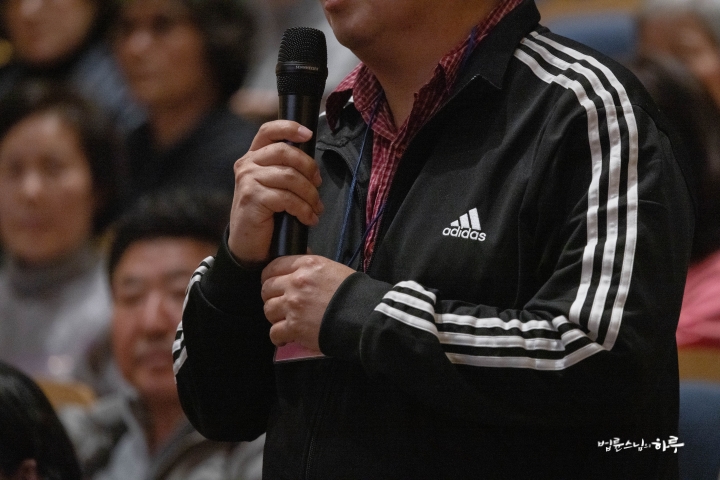
I want to end my relationship with siblings who have caused me a lot of pain. I’m worried that showing this attitude will distress my mother who lives alone. What should I do?
I’m feeling desperate after severely injuring my back during interior construction work. I’m concerned about my old age as things will only get harder as I get older.
I received a suspended sentence after committing an offense while suffering from obsessive-compulsive disorder. Would using an electric shock device to punish myself when I break rules help with my treatment?
My son is 38 years old and still lives with me. He drinks until he passes out and seems to be suffering from depression. How should I view my son so that I can find peace of mind?
Many people raised their hands wanting to ask questions, but as it was approaching noon, the session ended with a promise to continue with the remaining questions at the next Dharma Q&A.
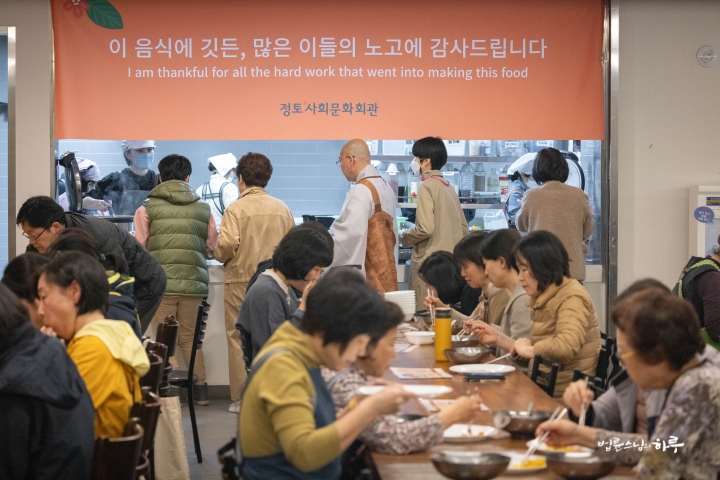
After having lunch with the Sangha in the dining hall on the first basement floor, Sunim spent the afternoon working in his office.

As the sun set, at 7:30 PM, Sunim continued with the Friday Dharma Q&A session in the main hall in the basement. Many citizens came to the Jungto Social and Cultural Center to attend. They registered on-site or submitted their questions before heading to the basement hall with light steps.
The Friday Dharma Q&A began with about 5,400 people connected via YouTube and around 100 people present at the venue. After reciting the Three Refuges and Words for Practice, Sunim took his place on the stage.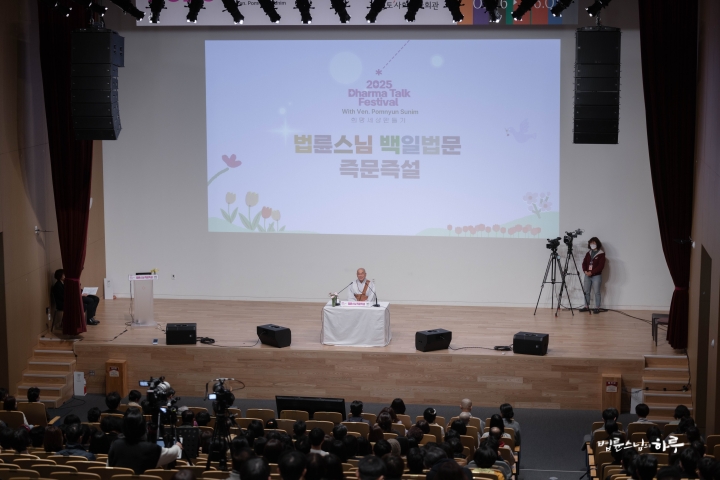
Today at around 11:22 AM, the Constitutional Court announced the impeachment of former President Yoon Suk Yeol. While President Yoon’s removal resolved the uncertainty that had weighed on Korean society for over four months since the December 3 martial law crisis, the conflict between political factions has intensified throughout the impeachment process. Sunim began his talk by discussing what perspective citizens should adopt in the current situation.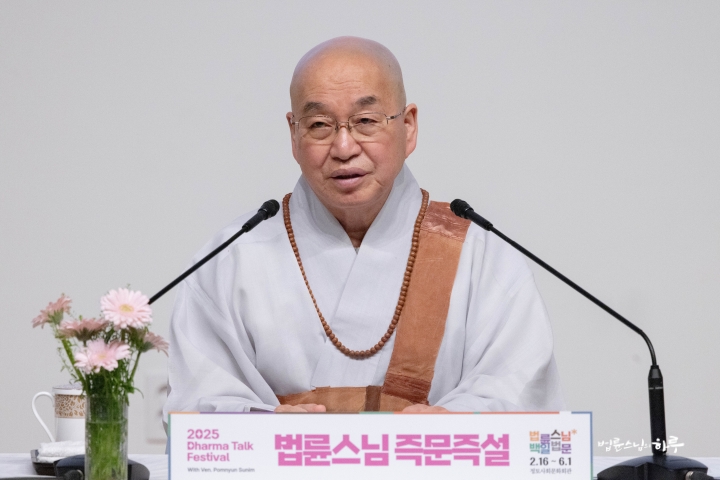
“President Yoon Suk Yeol was removed from office today for violating the Constitution and laws by declaring martial law on December 3 last year, mobilizing the military and police to damage constitutional institutions including the National Assembly, and abandoning his duty to uphold the Constitution. The impeachment was unanimously decided by all eight justices of the Constitutional Court. Such an unfortunate event should never happen again in our constitutional history. This is truly regrettable. It’s a great dishonor and pain for the impeached individual, and the losses suffered by the Republic of Korea and the emotional distress experienced by its citizens due to poor judgment are also immense.
Presidential Impeachment: Why Does It Keep Happening?
But why does this happen not just once, but twice? This is because during the 1987 constitutional amendment for direct presidential elections, the focus was solely on achieving direct elections, without properly anticipating the side effects that could arise from granting excessive power to the president. The excessive power held by presidents has led to disgrace for past presidents. To prevent this from happening again, I hope all citizens will come together to implement safety measures that distribute some presidential powers to the cabinet.
When power is excessively concentrated in one person, there may be benefits, but various problems are bound to occur during the five-year term. If the highest official in government bears all this responsibility, it becomes difficult to complete the term safely, and even after completing it, the pattern of imprisonment after leaving office continues. In most cases, this is evaluated as an issue of the president’s personal qualifications. Of course, there are cases where individual qualifications are lacking. However, if we say that all eight presidents lacked qualifications, this would be an insult to the citizens. It would raise the question of why citizens repeatedly elected unqualified presidents. This is tantamount to arguing that citizens don’t know how to properly exercise their sovereignty and therefore their sovereignty should be revoked. It’s easy to blame individuals, but this also places responsibility on all citizens. While we can question individual qualifications, if the same issues keep recurring, we must also acknowledge that there’s a problem with the excessive power granted to the president. 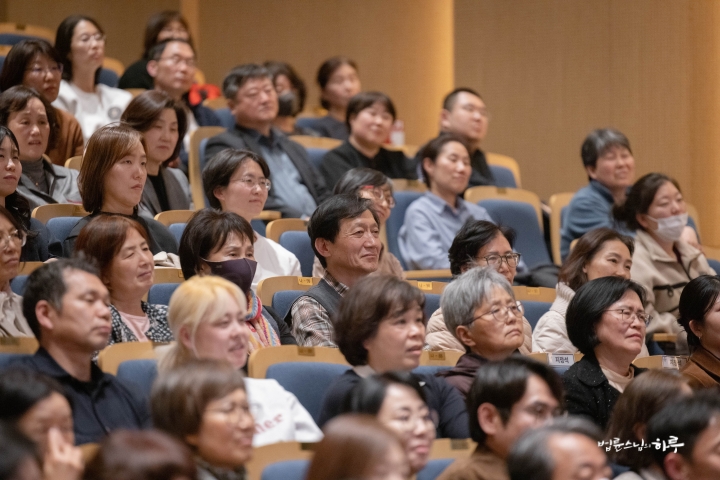
According to the original constitution, the president appoints cabinet ministers upon the recommendation of the prime minister. However, in reality, all power is concentrated in the president, and the prime minister is essentially a figurehead. The same applies to government ministers. The president and Blue House staff make all national policy decisions, while ministers merely follow predetermined scripts. If the National Assembly were to elect or recommend a prime minister who would actually run the government, and ministers were appointed upon that prime minister’s recommendation with greater authority given to them, then when problems arise, only the relevant minister would need to resign and take responsibility. One can only be held accountable if they have authority; it’s not right to demand accountability from those without power. If more serious issues emerge, the prime minister could take responsibility and the entire cabinet could resign, allowing for cabinet restructuring without requiring a new election. This would also ensure the president’s five-year term remains secure.
Globally, most democratic countries with economic power similar to South Korea’s, except for the United States, have adopted a cabinet system. However, Korean citizens still strongly believe that “I must elect the president with my own hands.” Therefore, for the time being, we could consider adopting a semi-presidential system, which is an intermediate form between the presidential and parliamentary systems. In a semi-presidential system, the president handles foreign affairs, security, and defense as the head of state, while the prime minister manages domestic affairs. If the majority party changes through mid-term elections, the prime minister position can be given to that party, reflecting the people’s will at that time. The current system, where once elected, a president serves for five years without any corrective mechanisms, can be unfortunate for both the country and its citizens. It’s also dangerous that impeachment is currently the only way to address presidential misconduct. In this situation, where there is a high risk of recurring misfortune, retaliatory sentiments between the two parties can deepen conflicts. In the past, despite conflicts, parties would accept defeat in elections and court rulings, but now people refuse to accept court decisions, claiming “the trial was flawed,” and deny election results by alleging “election fraud.” As a result, maintaining constitutional order is becoming increasingly difficult.
Rather Than Resolving Everything Through Law, We Should Honor the Will of the People
If someone is celebrating and cheering because the side they support won in court, that person can only see one perspective. Politics isn’t something judges should do. Politics should follow the will of the people. Legal judgments are only a last resort. Yet nowadays, our society tries to resolve everything through law. Then why do we need politics? We would only need laws. More important than “whether something complies with the law or not” is “whether citizens want it or not.” From this perspective, I hope politics can be restored. I hope we will see fewer cases where all matters are left to the courts. 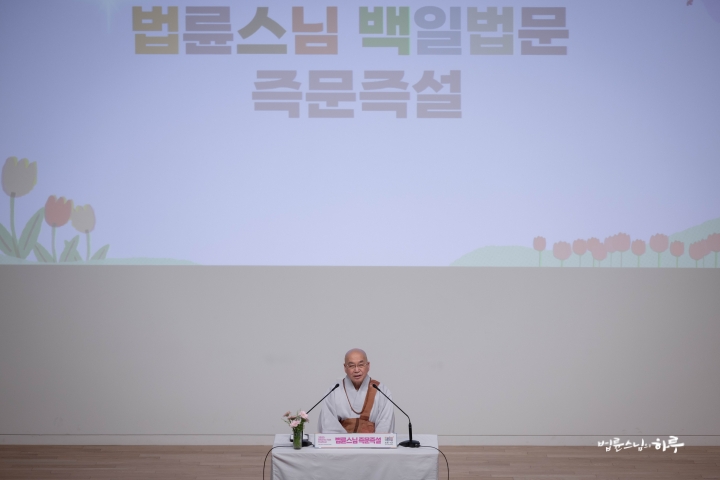
It’s important for politicians to adopt an attitude of serving the people’s will. If they are loyal only to the party or leader who nominated them and not to the citizens, that is not true loyalty. Those who are not loyal to the people and the country are the real traitors. It’s not desirable to label someone a traitor just because they don’t show loyalty to a particular faction. Feeling resentful or angry because the outcome of a past event wasn’t what I wanted only hurts myself. Conversely, it’s not something to rejoice and dance about if the result turned out as I hoped. We should always remember that when we are smiling, someone else might be crying.
To Prevent the Recurrence of the Misfortune of Presidential Impeachment
The current election system in South Korea follows the principle of majority rule, where everything is decided by whoever receives even one more vote of support. In the current situation where progressives and conservatives are almost evenly matched, this approach ultimately becomes a game of repeated wins and losses. If emotions escalate, it could eventually lead to violence. Therefore, we should learn from this unfortunate situation and build social consensus on establishing institutional safeguards to prevent such incidents from recurring. If we just move on because we lack time, the next president will become another victim. Only then will we belatedly discuss constitutional amendments. Even if we’re busy, we should push for constitutional reform to distribute presidential powers before holding elections to prevent future misfortunes.
If more consensus can be reached, we should also improve the current structure where the central government’s power is too strong and local autonomy is too weak. While the introduction of local autonomy is certainly positive, true autonomy requires the transfer of substantial authority. The central government’s powers should be transferred to regional local governments, regional powers should be transferred to basic local governments, and basic local government powers should be further transferred to the people. Currently, citizens are only the masters during elections, but for the next four years, agency heads become the masters. The country is being run in a way where the president acts like a king and agency heads act like magistrates. Strengthening local autonomy doesn’t mean local government heads should act like kings; it means citizens should have real authority in their daily lives. Whether it’s a member of the National Assembly or the president, if they do wrong during their term, we should establish a system where citizens can recall them rather than always resorting to the extreme measure of impeachment. 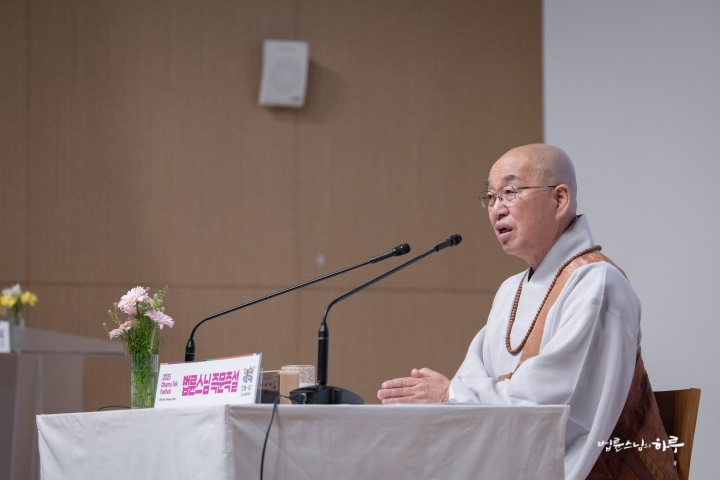
Another necessary change is the improvement of the electoral system. The current electoral system is a winner-takes-all structure where gaining even one more vote means taking everything. This system distorts the will of the people. For example, a party might receive only about 5% more votes but end up occupying more than 70% of the seats in the National Assembly, which is actually happening. We need to establish complementary measures that can reflect proportionality and representation to reduce these wasted votes. While perfect alignment is impossible, the number of seats should relatively closely reflect the will of the people. If just these three reforms are implemented—dispersing presidential powers, decentralizing central authority, and reforming the winner-takes-all electoral system—the situation could improve significantly.
Finally, it is necessary to change to a flexible constitution that makes constitutional amendments more manageable. In the current state where constitutional amendments are too difficult, we cannot reflect the changes of the times. The constitution should be supplemented to better guarantee citizens’ basic rights to survival, considering realities such as the climate crisis and wealth disparity. Korean society today is very different from when the direct presidential election system was amended in 1987. These changes need to be reflected in the constitution, but the current amendment procedure makes it too difficult. Therefore, I hope that this time, amendments can be made starting with basic matters that both ruling and opposition parties can relatively easily agree upon. 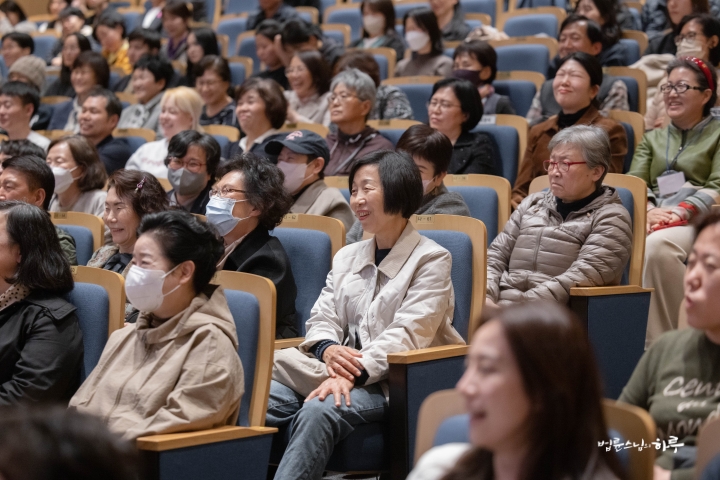
I believe what I’ve just mentioned are areas where agreement between the ruling and opposition parties should be relatively easy to achieve. Nevertheless, the reason agreements consistently fail to materialize is because whoever is next in line for power either disagrees or responds lukewarmly. Most people think they can do better than their predecessors. When they actually make mistakes while in office, they suddenly want to amend the constitution, but by then, the next potential power holder refuses to accept these changes. This cycle has already repeated five times. Every candidate has promised constitutional reform upon becoming president, but none has kept that promise. Therefore, this time we should at least make minimal amendments and transform our constitution into a flexible one. After that, the newly elected president can gather broader public consensus during their term and implement more detailed amendments.
What We Need Now Is an Attitude of Reconciliation
We must all come together to ensure that the unfortunate impeachment of a sitting president never happens again in the constitutional history of the Republic of Korea. I hope people don’t view this simply as a matter of winning or losing. The current international situation is also very challenging. Trump’s tariff barriers and the hegemonic competition between the United States and China make our future uncertain. Even if we put our heads together and consult with each other, it’s unclear whether we can overcome these barriers. If we remain internally divided as we are now, our national fortune will inevitably decline. Rather than blaming this situation solely on a few leaders, I hope that you, the citizens, will adopt the right mindset as sovereign people.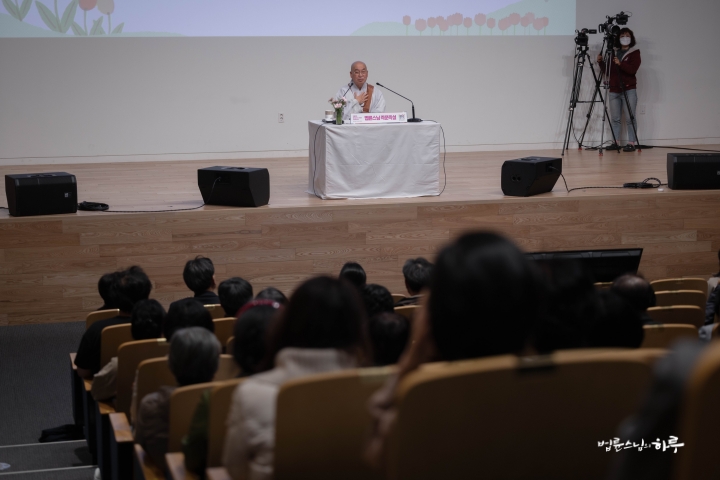
What we need now is an attitude of reconciliation by calming our emotions. The defeated must accept the outcome gracefully, and the victors must embrace inclusivity. We shouldn’t speak as if justice has prevailed simply because the verdict went our way. Our task now is to normalize the constitutional order of the Republic of Korea, which was damaged by the December 3rd martial law. During the two months remaining until we elect a new president, I hope that you, the citizens, will elect a leader with the right attitude, and that political leaders will engage in fair competition to promote national development with a spirit of unity.”
For an hour and a half, six people raised their hands to engage in conversation with Sunim. One person sought Sunim’s advice on how to manage their feelings when repeatedly experiencing unfair treatment at work.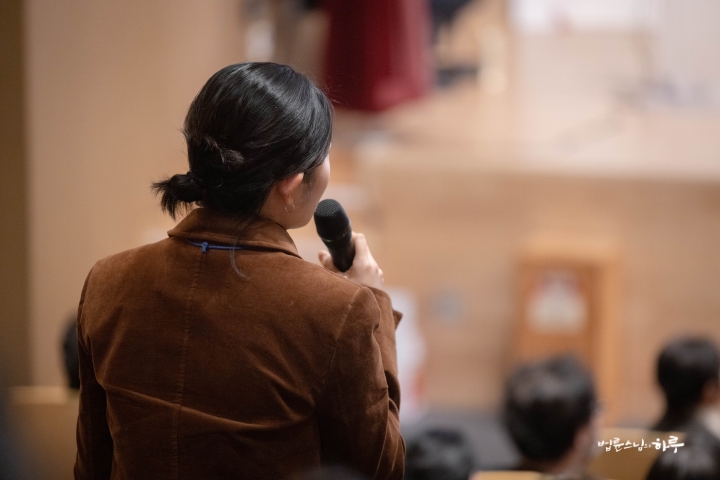
I Feel Wronged Because I’m Often Treated Unfairly at Work
“You should be grateful for things that deserve gratitude, but how can you be grateful for unfair treatment? Should you be grateful if someone sexually harasses you? That would be foolish. The negative effects you’re experiencing come from thinking you must be grateful for everything. Could you tell me specifically what happened to you?”
“I’m a permanent employee, and there’s a contract worker in our team. Our team purchases about 9 million won worth of supplies every month or two. The contract worker buys items without consulting me first, then asks me to sign off on the purchase.”
“Then you shouldn’t sign.”
“I tried that, but they insisted I sign, saying it was urgent.”
“Still, don’t sign. Tell them, ‘You made the purchase on your own, so you should report directly to the team leader. I can’t sign because I didn’t approve it.'”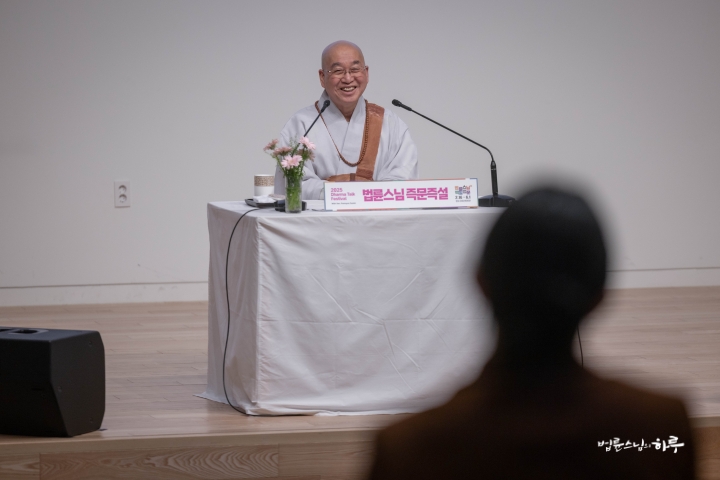
“But the team leader told me to just sign it.”
“Then sign it. It becomes the team leader’s responsibility.”
“But then I end up being audited.”
“If an audit comes, just tell the truth: ‘I didn’t approve this, but I signed it because the team leader instructed me to do so.’“
“But I don’t have evidence that the team leader gave such instructions. I don’t have a recording.”
“Of course there’s no documentation for verbal instructions. Recently, there was testimony that a president called military commanders and ordered them to arrest members of the National Assembly, but the president denied it. While we can’t be 100% certain, circumstances suggest there’s some truth to it. If these incidents keep happening, keep records. Note the date, who purchased what items and for how much, that you didn’t approve it but signed because the team leader instructed you to. Whether you write it in a notebook or save it on your computer, maintain a record. Don’t worry.”
“I understand.”
The questioner continued with another concern.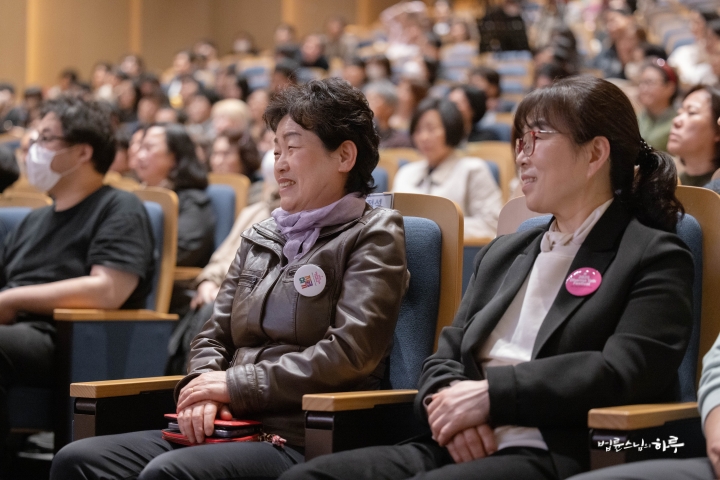
I’m Struggling Because My Team Leader Gives Me Too Much Work
“Another issue is that every team leader gives me too much work.”
“That’s actually a good thing.”
“But I work desperately. I do a lot of overtime, and even after work, I can’t rest because work stays on my mind. I wake up suddenly at night thinking, ‘How does this work legally? What’s the basis for this?’ and so on.”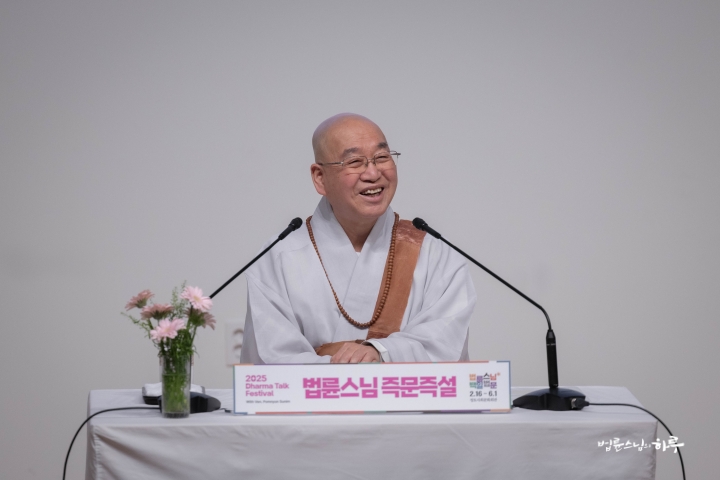
“Then your work skills will improve rapidly. That’s a good thing. When you’re young, you should work like that. It’s better to face challenges without fear than to just focus on salary or hours. You’ll be fine.”
“But it’s physically exhausting. Team leaders seem to think they can naturally take advantage of me. Last year, my colleague didn’t understand the work or know how to handle administrative tasks, so I did everything. They were more than ten years my senior. This year, when my colleague changed, the team leader told me to do everything again because I was the senior staff. When I asked, ‘Last year I did everything because I was junior, but do I have to do everything this year too?’ they told me not to bring up the past. This time, even though I became the youngest, they said I should take the lead because I’m single and don’t have children. Why do all the team leaders I meet distribute work unfairly and try to overwork just me?”
“I face the same situation. For example, when I assign tasks to several staff members, some consistently complete their work properly, some never do, and others make frequent mistakes. Initially, I point out errors and ask for corrections, but over time, I learn each person’s style. After working with someone for a year, I generally understand their patterns. When there’s an urgent task, who would you assign it to?”
“I don’t want to answer.” (laughs)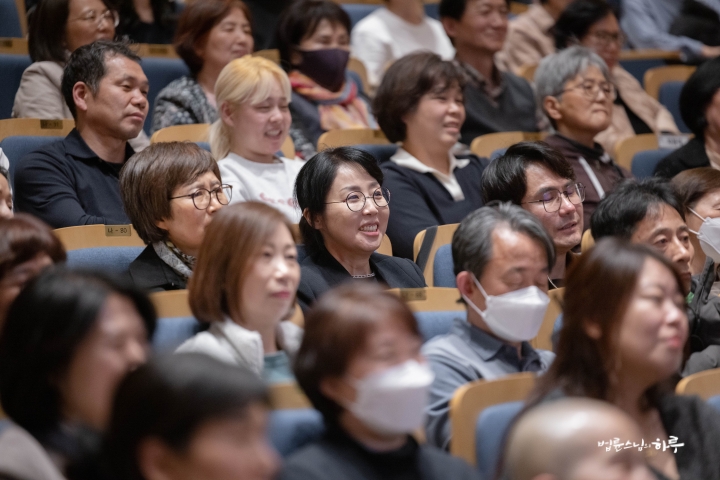
“This happens not because someone is senior or junior. Supervisors need operations to run smoothly, so they inevitably assign tasks to people who perform well. And when that person complains, ‘Why do you always ask me?’ I might respond, ‘Because you’re junior, you should work hard!’ or ‘Because you’re senior, you should work hard!’ What does a mother say when siblings fight? To the older sister, she says, ‘You’re the older one, so be patient.’ To the younger one, she says, ‘You’re younger, so you should be patient. Why are you challenging your sister?’ A mother adapts her responses to each situation. Later, when the children grow up, the younger one says, ‘Mom always scolded me for being younger,’ while the older one says, ‘Mom always scolded me for being older.’ But the parent wasn’t discriminating; they were responding to each situation. For example, when asking the younger child to run an errand and they protest, ‘Why only me?’ the mother responds, ‘Because you’re younger, you should do it. Who else?’ When asking the older child and they protest, the response becomes, ‘Because you’re older, you should do it. Who else?’ There’s no fixed principle that ‘older siblings must do this’ or ‘younger siblings must do that.’ Life simply flows from moment to moment. If your team leader had the wisdom of the Buddha, they would distribute work wisely considering various circumstances. Is your team leader at that level?”
“Not even close.”
“I see. So your team leader’s behavior is natural. They’re definitely not trying to torment you. Rather, they trust you. While you feel exploited, from your team leader’s perspective, they have confidence that you’ll complete tasks properly.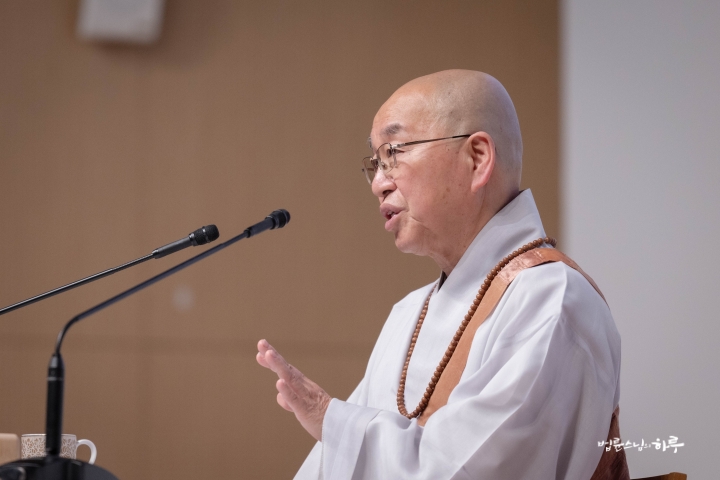
If you’re truly overwhelmed with work, you need to handle it cleverly. They keep giving you more work because you complete everything properly and on time. If you miss deadlines or do a poor job, they’ll scold you terribly. Just take some criticism. After a few repetitions, they’ll decide you’re unreliable and stop giving you so much work.
But with your personality, could you actually do that? You’re someone who wants to be recognized for doing good work. So this isn’t your team leader’s problem—it’s yours. Try going in tomorrow, accepting the work with a ‘Yes, I understand,’ and then not doing it. When they ask about it, just say, ‘Oh, I completely forgot about that.’ Keep acting incompetent. If they ask why it’s not done, say, ‘It was too difficult, so I couldn’t complete it yet.’ Saying ‘You’re giving me too much work’ sounds like complaining, but saying ‘This seems too difficult for my skill level’ is simply providing information about yourself. If they say, ‘You used to do well, what happened?’ you can respond with humor: ‘Well, maybe my brain isn’t working because I’m not married.’ If they say, ‘You’re not married and don’t have children, so please take on this task,’ reply with, ‘Perhaps my brain doesn’t work well because I don’t have children. Should I have some?’ Answer with a smile and keep delaying the work. Eventually, your team leader will develop a solution—either working overtime themselves or assigning the task to someone else. But you don’t seem to have the courage to do this. You’d rather work all night than be told you’re not doing a good job, wouldn’t you?”
“I tried missing a deadline once, and my team leader scolded me intensely for thirty minutes. They continue to reprimand me after that.”
“If you go back to being diligent after being scolded once, they’ll keep scolding you because they’ll think, ‘This person works well when reprimanded.’ It’s like training animals with carrots and sticks—hitting them when they don’t listen and rewarding them when they do. If the other person can predict your reactions this way, you’ll be manipulated. So if you want to reduce your workload, respond with ‘I understand, I’ll work hard,’ but don’t actually do the work. When your team leader gets angry, say, ‘I’m sorry, I’ve been struggling lately.’ Even if they threaten, ‘I’ll fire you if you don’t do your job properly!’ don’t respond with defiance like, ‘Go ahead and fire me. Are there no other jobs?’ Instead, say, ‘I’m sorry. I still need to be here. Where would I go? I have nowhere else to go,’ and hold your ground.
But in life, it’s actually easier to receive praise than criticism. That’s why most people live in ways that earn them praise. Even though you’re complaining now, I don’t think you’re someone who can live with being criticized. The easiest path is usually to do what you’re naturally good at.”
“Thank you.”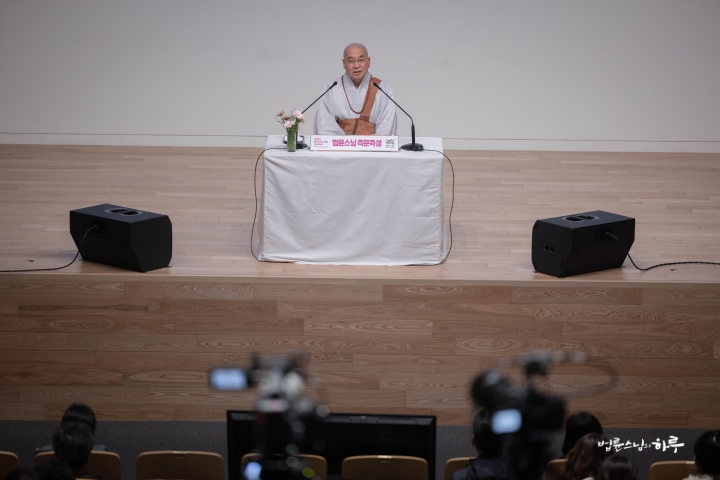
“I’m not saying you absolutely have to live that way. I’m suggesting it might be easier for you since that’s your strength. Being good at something isn’t always beneficial. When you excel at work, expectations rise accordingly. You might think children from wealthy families wouldn’t complain about allowance, but that’s not always true. Children from struggling families accept getting little or no allowance, but those used to receiving more become dissatisfied when their allowance decreases even slightly. Companies work the same way—being good doesn’t only bring benefits; it comes with increased demands. So if your current work is overwhelming, you should prioritize health over praise. Health is more important than recognition. You need to shift your perspective to ‘I need to regain my health even if it means being criticized.’ However, I personally found this difficult. So I decided not to fear work. I’ve positioned myself in life as someone who just does all the work that comes my way. But even then, when tasks pile up, it’s impossible to complete everything.”
“Thank you. After hearing that my boss might think, ‘They listen well when scolded!’ I realize I need to be more bold. I’ll either consistently perform well or adjust my workload even if it means being scolded.”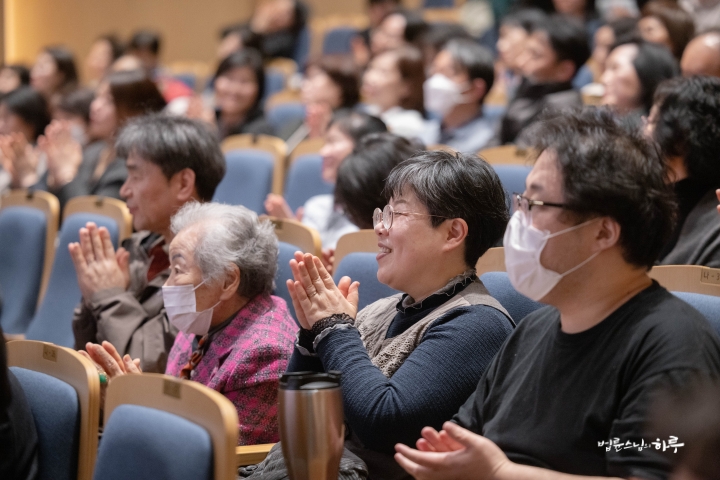
The questions continued.
My husband erupts in anger whenever I speak more than two sentences, and my daughter also gets upset when I talk, asking why I’m speaking again. It’s very difficult for me.
I confessed my feelings to someone I was interested in and was rejected. I feel ashamed. What mindset should I have when meeting new people?
I sent summary notes to help a fellow student, but ended up feeling deflated when they received a higher score than me. What criteria should I use when helping others?
I tried to do well after opening a new kindergarten, but ended up being reported for abusive behavior. I feel both wronged and embarrassed. How can I get through this period?
By the time the conversation ended, it was past 9 PM. The session concluded with the Four Great Vows, with a promise to meet again at the same time next week.
Tomorrow will be the 48th day of the 100-Day Dharma Talk. In the morning, Sunim will give a Dharma talk for participants in the 1080 Prostrations Practice, and in the afternoon, he will conduct a Dharma Q&A session for “Gilbeot,” a gathering of broadcasting, film, theater, and art professionals.




